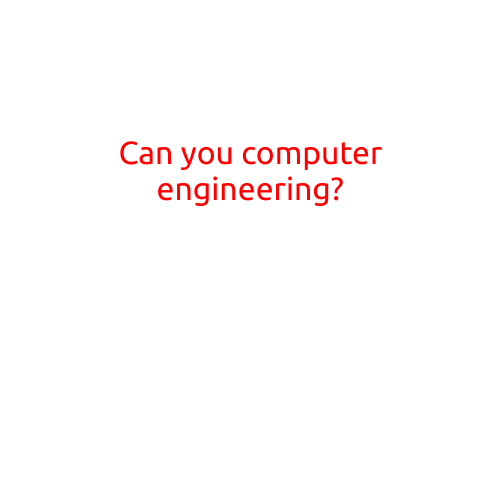
Can You “Computer Engineer”?
In today’s technology-driven world, the field of computer engineering is more relevant than ever. With the rapid advancement of technology, computer engineering has become a crucial discipline that enables the design, development, and testing of computer systems and hardware. But what exactly is computer engineering, and can you “computer engineer”?
What is Computer Engineering?
Computer engineering is a combination of electrical engineering and computer science, involving the design, development, testing, and manufacturing of computer hardware and software. Computer engineers use their knowledge of electrical engineering, computer science, and mathematics to create innovative solutions for a wide range of industries, from consumer electronics to aerospace and defense.
The field of computer engineering encompasses a broad range of applications, including:
- Hardware design: Developing the physical components of computer systems, such as microprocessors, memory devices, and data storage systems.
- Software development: Creating the programming and algorithms that run on the hardware, including operating systems, applications, and firmware.
- Computer networks: Designing and implementing computer networks, including local area networks (LANs), wide area networks (WANs), and the internet.
- Embedded systems: Developing software and hardware for embedded systems, such as smartphones, tablets, and other mobile devices.
- Artificial intelligence and machine learning: Designing and implementing AI and ML algorithms and systems.
Can You “Computer Engineer”?
So, can anyone “computer engineer”? The answer is yes! With the right education, training, and skills, anyone can become a computer engineer. Here are some essential skills and qualities required to succeed in computer engineering:
- Math and science foundation: A strong understanding of math and science, particularly in areas like algebra, geometry, calculus, and physics.
- Programming skills: Proficiency in programming languages like C++, Java, Python, and assembly language.
- Electrical and computer engineering knowledge: Understanding of electrical circuits, digital logic, computer architecture, and microprocessors.
- Problem-solving and analytical skills: Ability to analyze complex problems, identify solutions, and design and implement efficient systems.
- Communication and teamwork skills: Ability to work effectively with others, communicate complex ideas, and present findings.
How to Get Started
If you’re interested in pursuing a career in computer engineering, here are some steps you can take:
- Education: Pursue a bachelor’s or master’s degree in computer engineering or a related field, such as electrical engineering, computer science, or computer information systems.
- Gain practical experience: Participate in internships, research projects, or hackathons to gain hands-on experience in computer engineering.
- Develop essential skills: Focus on developing your programming skills, including languages like C++, Java, and Python.
- Join online communities: Participate in online forums, discussion groups, and social media platforms to stay updated on the latest developments in computer engineering.
- Stay curious and keep learning: Continuously update your skills and knowledge to remain competitive in the field.
In conclusion, computer engineering is a challenging and rewarding field that requires a strong foundation in math and science, programming skills, and problem-solving abilities. With the right education, training, and skills, anyone can become a computer engineer and contribute to the development of innovative technologies that shape our world.





